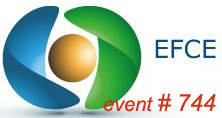General Information
- (Please avoid that the e-mail ecce12_ecab5@aidic.it is junked by your system)
- About ECCE12
- About ECAB5
- Promoters & Organizer
- Sponsors & Exhibitors
- Steering Committee
- Organizing Committee
- Scientific Committee
- Student Committee
- Scientific Topics
- Plenary Lectures
- Programme Highlights
- Registration
- Congress Venue
- Accommodation
- Congress Leaflet
- CONTACTS
-
Time to event -2297 Days to GO

Mini symposium 1: 3rd Workshop on Electrochemical Engineering: Industrial Electrochemistry and Electrocatalysis
Summary
The Working Party on Electrochemical Engineering is one of the divisions of the EFCE, which aims to promote knowledge, applications and networking in the field of electrochemical engineering and applied electrochemistry (http://www.efce.info/Electrochemical+Engineering.html).
To do this, we organize every three years a scientific meeting (European Symposia on Electrochemical Engineering), an educational activity (European Summer Schools on Electrochemical Engineering) and an award (The Carl Wagner Medal of Excellence in Electrochemical Engineering).
Recently, we have realized that there is a need for scientific as well as general discussion in our field, in particular within congresses focused on chemical engineering. Thus, in order to allow setting a place for discussion on Electrochemical Engineering within the European and World Congresses on Chemical Engineering, our WP has designed a new type of event: the Workshop on Electrochemical Engineering. It consists of a topical meeting tailored to the aim of the Congresses, fitted into their frame and organized with the support of the national community of electrochemists and electrochemical engineers, in charge of the organization of the general congress.
The debate started during the two previous meetings: ECCE10th in Nice, in 2015 and WCCE10 in Barcelona, in 2017.
The first one in Nice was focused on strengthening the collaboration between companies and academics within the electrochemical engineering community; the second one, was co-organized with the Spanish Excellence Network on Environmental and Energy Applications of the Electrochemical Technology.
For the ECCE12 the 3rd Workshop on Electrochemical Engineering aims to continue the discussion on the role of Electrochemical Engineering on the current scientific and industrial scenario, focusing on the impact of the electrochemical and bio-electrochemical technologies on emerging and traditional problems such as the global energy market and the energy supply, the water and soil remediation/preservation, as well as the synthesis and modeling of new performing materials for electro and photo-electro-catalytic processes.
Participants will be researchers and industrialists with interests in electrochemistry or electrochemical engineering. Presentations of research interests will be combined with discussions on new ways to collaborate and associated problems and opportunities.
Short research presentations will finish with a round table discussion of strategic topics in electrochemical engineering. In addition, there will be a ‘partnering’ session to discuss possibilities for collaboration
You may also take advantage of the general meeting and interact with other communities in chemical engineering.
We hope you find this exciting and will join us in this meeting. We look forward to welcoming you
Topics
►Topic 36: ELECTROCHEMICAL REACTORS
Design, characterisation, modelling and scale-up of electrochemical reactors
Electrode design, electrocatalysis
►Topic 37: INDUSTRIAL ELECTROCHEMISTRY
Electrochemical synthesis of organic and inorganic products
Electrowinning of metals and metal recovery
Electrodeposition of materials, including ceramics, polymers, alloys and composites as well as electrophoresis, 3-D printing and fast manufacturing
►Topic 38: ELECTROCHEMICAL ENGINEERING IN ENVIRONMENTAL PROTECTION
Electroseparation processes, Pollution abatement, Electrochemical treatment of water, Electrochemical treatment and recycling of waste and wastewater, Soil remediation
►Topic 39: ELECTROCHEMICAL ENERGY CONVERSION AND STORAGE
Electrolyzers, Fuel cells,including bio-fuel cells, batteries, including flow batteries and supercapacitors
►Topic 40: CORROSION PROTECTION ENGINEERING
Electrochemical basis of corrosion and corrosion-wear processes and protection
Engineering aspects of corrosion protection, including coatings
►Topic 41: OTHER AREAS
Bio-electrochemical engineering, electro-microbial engineering, photoelectrochemical engineering, sonoelectrochemical engineering, electrochemical promotion, electrochemical sensors, drug delivery
Education, training, information storage and retrieval and software development related to electrochemical engineering
Organizing committee of the symposium
Simonetta Palmas, University of Cagliari, Italy
Simonetta.palmas@dimcm.unica.it
Manuel Rodrigo, UCLM, Spain
manuel.rodrigo@uclm.es
Ann Cornell, KTH, Sweden
amco@kth.se
Karel Bouzek, UCT Prague, Czech Republic
karel.bouzek@vscht.cz
Claudia Weidlich, DECHEMA-Forschungsinstitut,Germany
weidlich@dechema.de
Instructions for abstract submission
► Abstracts is max two pages long and is written in English according with the template (ECCE12_Symposium1)
►
Please submit the abstract file as .docx .
►
Name the abstract file as First-Author-lastname.docx (ex.: Smith.docx).
► During the submission procedure you will provide the abstract title, the list of authors with affiliations and addresses and the preferred topic.To start the abstract submission you have first to select the number of authors of the abstract. If the number is greater than six, fill in data for the first six authors and then submit via e-mail the data of the remaining authors (from the 7th co-author on; max 8 co-authors.).
► You are kindly asked to check carefully the information you submit here, since they will be included in the conference database and used for all congress related activities. Please write only the first name (neither middle-name nor middle initial) and the lastname. Italians are suggested to fill in the affiliation in Italian and not in English.
|
SYMPOSIUM 1 ABSTRACT
|
|
|
Please select the authors number of the paper |
Confirmation
of abstract submission will be displayed immediately after submission.
You will NOT receive any confirmation by e-mail.
Information
to Authors on abstract acceptance will follow the assigned deadline
Organized by AIDIC The Italian Association of Chemical Engineering